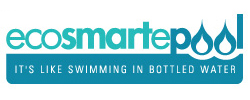Salt Water Pool Chlorinators
No regular chemicals with ECOsmarte
Different salt chlorinators are available to help with cleaning bacteria, algae, and viruses from your swimming pool, but are they really your best option? Salt water chlorinators involve the use of harsh chemicals to act as cleaning agents. However, there is a better way—a more natural and environmentally friendly concept. This concept involves no chlorine, no chemicals, and no toxins released into the surroundings into which you are enveloping your body.
With an ionic and oxidation process of eliminating pollutants from your pool, you are incurring hygienic waters from a natural process, free from the chemicals used with salt chlorinators. Natural oxygen is used as an oxidizer. An ionic water purification system alone still requires the use of some chemicals, as it does not deal with the problems of oils and lotions that come from human skin, and it does not prevent your pool walls from staining. However, a combination of copper ionization and natural oxygen will help turn your pool into a natural one. The water will feel
silky, unlike any water you have experienced within other pool systems.
With a salt chlorinator, swimmers have to exit the pool and immediately shower to try to remove any excess chemicals obtained in the water from their skin. Chlorine and salt can dry your skin, make your eyes sting and turn red, dry your hair, and cause your hair to slightly change its color. Chlorine and salt can cause an allergic reaction to some people and can exacerbate symptoms of asthma.
If you happen to get a mouthful of swimming pool water, which almost everyone does at some point or another, it won't taste terrible and you won't have to worry about harmful chemicals getting inside your body if you are using a purer and healthier alternative to cleaning your pool than pool chlorinators.
Salt chlorinators turn salt into chlorine and hydrogen gas through a chemical reaction with the help of an electric current. Research has shown a possible link between chlorine and cancer. It has also been linked to asthma.
A salt chlorinator can damage your pool equipment through the chemicals they produce. Also, certain swimming pool covers, such as automatic and vinyl covers, can be damaged by pool chlorinators. Unlike salt water chlorinators, you won't have to worry about stains and scaling of your pool walls caused by calcium buildup from an ionic purifying system with natural oxygen.
Breathing in chlorine fumes produced by pool chlorinators is thought to be harmful to your respiratory system and lungs. Some people experience pain running through their nasal passages and down into their chest when inhaling chlorine fumes.
You will save time and money when using an ionic purifying and oxidation system. You won't have to purchase expensive chemicals on a regular basis or handle harsh chlorine. Pumps working with a natural cleaning system operate for only six to 10 hours; they don't have to run all the time. Also, backwash or spills from the pool are not harmful, as they could be with a pool chlorinator.


